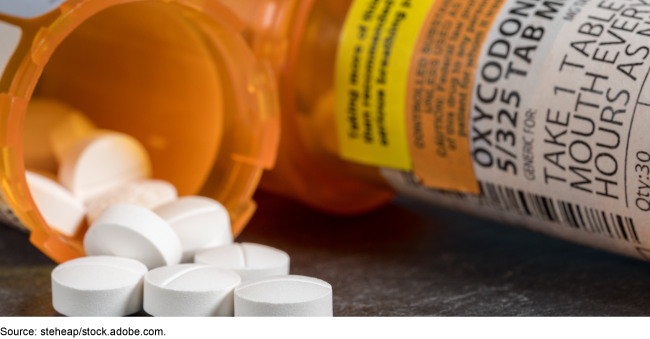Opioid Use Disorder Grants: Opportunities Exist to Improve Data Collection, Share Information, and Ease Reporting Burden
Fast Facts
Nearly 100,000 people in the U.S. died of drug overdoses from July 2023-June 2024. A vast majority of those deaths—about 75%—involved opioids.
Since FY 2018, the lead federal health agency for the opioid crisis awarded about $8.1 billion to states and $307.5 million to tribes to address it.
Grant recipients funded prevention, treatment, and other services. But:
The agency hasn't collected data on subrecipients that ultimately received funding
Some grant recipients said it was hard to find lessons learned from other successful projects
Tribes reported that administrative burdens stymied participation
Our recommendations address these issues.

Highlights
What GAO Found
The Opioid Response grant programs—State Opioid Response (SOR) grants and Tribal Opioid Response (TOR) grants—help address the opioid crisis by funding prevention, harm reduction, treatment, and recovery support services. SOR grants are available to states, D.C., and U.S. territories; TOR grants are available to federally recognized Tribes and tribal organizations. Since fiscal year 2018, the Substance Abuse and Mental Health Services Administration (SAMHSA) has awarded about $8.1 billion in SOR grants and $307.5 million in TOR grants nationwide. SAMHSA allocates funding based on factors such as overdose death rates, and recently revised its allocation to better ensure funding goes to recipients with the greatest need.
State and Tribal Opioid Response Grant Funding, Fiscal Years 2018-2023

Selected SOR recipients reported using grant funding for a variety of services, adapted to support their specific needs. States generally supported treatment for opioid use disorders, and most provided services not covered by other payers, such as transportation. Selected TOR recipients reported using funds primarily to support prevention and harm reduction efforts, such as community education.
SAMHSA collects information on proposed subrecipients, which are organizations recipients anticipate will provide grant-funded services. However, proposed subrecipients are subject to change, and SAMHSA does not collect information about the actual subrecipients once awards are made. SAMHSA officials said that collecting such information could help with efforts to improve the programs. They are determining how to address a new statutory requirement to collect and report information on the “ultimate recipients” of the Opioid Response grants. As of October 2024, the agency had not completed, documented, or implemented a plan for doing so.
SAMHSA has taken steps to address some challenges raised by grant recipients, but other challenges remain. For example, some grant recipients reported challenges obtaining data on services and results of other grant recipients. Obtaining these data would help grant recipients have additional information to use to help improve the services they offer. SAMHSA developed a data sharing strategy but has not determined specific details and time frames. Implementing such a plan would better position SAMHSA to improve how funds are used.
In addition, five tribal recipients reported that grant-related administrative challenges contribute to some Tribes not participating or not making full use of TOR. Two executive orders direct agencies to address administrative burdens for Tribes to the extent practical and permitted by law. However, SAMHSA has not assessed whether there are permissible ways under the orders to help reduce such administrative burdens, which could help to allow additional Tribes to benefit from TOR funding.
Why GAO Did This Study
The misuse of opioids has been a long-standing problem in the U.S., representing a serious risk to public health. Opioid-related overdoses accounted for about three-quarters of the estimated 96,801 drug overdose deaths in the 12-month period ending in June 2024. SAMHSA leads federal public health efforts to address the opioid crisis, including administering the Opioid Response grant programs.
The Consolidated Appropriations Act, 2023, includes a provision for GAO to review the Opioid Response grant programs. In this report, GAO examines the allocation and use of grant funds, the information SAMHSA collects on grant subrecipients, and how SAMHSA has addressed any challenges with the use of the grant funds.
GAO reviewed relevant SAMHSA funding, allocation, and other documents, and interviewed SAMHSA officials. GAO also interviewed and reviewed information from 20 grant recipients (10 states, one territory, and nine Tribes or tribal consortia) selected to reflect variation in grant funding type (state or tribal) and amount changes, overdose deaths, and geography.
Recommendations
GAO is recommending that SAMHSA (1) complete and implement a plan for reporting subrecipient information; (2) complete and implement a plan to share data about the use of grant funding; and (3) assess whether and how to reduce administrative challenges faced by Tribes and take appropriate actions. The Department of Health and Human Services concurred with our recommendations.
Recommendations for Executive Action
| Agency Affected | Recommendation | Status |
|---|---|---|
| Substance Abuse and Mental Health Services Administration | The Assistant Secretary for Mental Health and Substance Use should complete and implement a documented plan for collecting and reporting information about Opioid Response grant subrecipients. (Recommendation 1) |
When we confirm what actions the agency has taken in response to this recommendation, we will provide updated information.
|
| Substance Abuse and Mental Health Services Administration | The Assistant Secretary for Mental Health and Substance Use should complete and implement a documented plan to share data or other information about the use of Opioid Response grant funding to allow grant recipients to compare their information with that of other grant recipients. (Recommendation 2) |
When we confirm what actions the agency has taken in response to this recommendation, we will provide updated information.
|
| Substance Abuse and Mental Health Services Administration | The Assistant Secretary for Mental Health and Substance Use should assess options for reducing the administrative burden faced by Tribes when applying for and using Tribal Opioid Response grant funding and make changes, as appropriate, in accordance with relevant executive orders. (Recommendation 3) |
When we confirm what actions the agency has taken in response to this recommendation, we will provide updated information.
|
